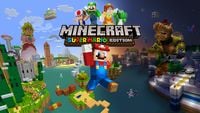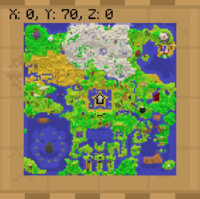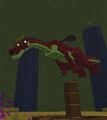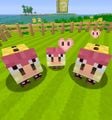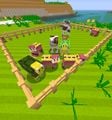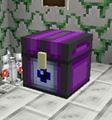Minecraft: Difference between revisions
Leo Sukaze (talk | contribs) (→Mobs: Added and corrected (alphabetically)) |
(→Map) Tag: Mobile edit |
||
| Line 229: | Line 229: | ||
Locations are often connected by Warp Pipe contraptions or World Map-like paths. Large sprite recreations and 3D statues appear across the entire map. Treasure, including ''Minecraft'' Music Discs and [[coin]]s, are often hidden at points of interest. | Locations are often connected by Warp Pipe contraptions or World Map-like paths. Large sprite recreations and 3D statues appear across the entire map. Treasure, including ''Minecraft'' Music Discs and [[coin]]s, are often hidden at points of interest. | ||
Entering ''Minecraft''{{'}}s Nether dimension through a recreation of the [[Valley of Bowser]] entrance features an explorable [[Bowser's Castle]] and additional landmarks. | Entering ''Minecraft''{{'}}s Nether dimension through a recreation of the [[Valley of Bowser]] entrance features an explorable [[Bowser's Castle]] and additional landmarks. The Nether itself is based on World 8 from modern platformers. | ||
{{br}} | {{br}} | ||
Revision as of 19:15, March 7, 2020
Template:Infobox Minecraft is a game released by Mojang AB and 4J Studios. It is a sandbox PC game with a blocky aesthetic centered around gathering resources to survive, exploring the randomly generated terrain, and creating worlds and sculptures using a variety of colorful blocks and tools, though the objective is largely based on the player's direction. The Wii U version of the game, known as Minecraft: Wii U Edition, was originally released for the Nintendo eShop on December 17, 2015,[1] and later released with a physical edition on June 17, 2016.[2] A Nintendo Switch port, known as Minecraft: Nintendo Switch Edition, was released for the Nintendo eShop on May 11, 2017.[3] Aside from the different controls and an increased map size, it is otherwise identical to the Wii U game. An edition of Minecraft for the New Nintendo 3DS, aptly titled Minecraft: New Nintendo 3DS Edition, was launched on September 13, 2017. The original game includes references to the Mario franchise, such as a painting featuring 100m from Donkey Kong (which was based on a painting by Kristoffer Zetterstrand), and the Wii U edition keeps these references.[4] However, all three Nintendo versions of the game also feature an exclusive Super Mario Mash-Up Pack, a complete Mario-themed reskin of the game's original objects, which was also released alongside the Wii U and Nintendo Switch physical editions.[2]
A new version of Minecraft: Nintendo Switch Edition, named simply Minecraft, was released digitally and physically on June 21, 2018. The new version allows cross-play with other consoles, namely the Xbox One, PlayStation 4, Windows 10, iOS and Android devices, which shares the same codebase known as "Bedrock" (originated from Minecraft: Pocket Edition). Players who purchased the Nintendo Switch port can have an option to upgrade to the new version for free.
Minecraft: Wii U Edition was discontinued after its final update in 2018 along with legacy console platforms.[5] Minecraft: New Nintendo 3DS Edition was also discontinued on January 15, 2019.[6]
Super Mario Mash-Up Pack
The Super Mario Mash-Up Pack was released as downloadable content for the Wii U version on May 17, 2016 (though it comes bundled with the physical edition), alongside the Nintendo Switch version on May 11, 2017, and as part of a free update to the New Nintendo 3DS version on June 5, 2018[7]. It was developed in conjunction with Nintendo.[8] Though the mechanics of Minecraft remain the same in the pack, everything has been visually changed to match the aesthetics of the Mario franchise, which includes different skins for the player and every block, item, and mob. There is also a premade world containing several Mario landmarks and multiple enemy gauntlets and jumping challenges[9]; additionally, the mash-up pack comes with its own soundtrack comprising entirely of music from Super Mario 64.
Skins
Skins are textures that the player can apply to change their appearance. There are forty Mario-themed skins that come with the pack. The skins, as they are titled and ordered from the selection screen, are:
|
The skins cannot be used in cross-platform multiplayer.
Mobs
Mobs make up the creatures that can be found across the world, both friendly and aggressive. Again, all of them exhibit the behavior of their original Minecraft counterparts (e.g. the Hammer Bros do not throw hammers and instead charge the players, just as the Zombies did previously).
Mario enemies and characters are listed first, followed by the original mob in parenthesis.
- Minecraft Mario Mash-Up Blooper.jpg
Blooper (Squid)
Boo (Ghast)
Buzzy Beetle (Endermite)
- Minecraft Mario Mash-Up Chincho.jpg
Chincho (Drowned)
Dark Bones (Wither Skeleton)
Dry Bones (Skeleton)
- Minecraft Mario Mash-Up Drybones.jpg
Dry Bones (Stray)
Flame Chomp (Blaze)
Gobblegut (Ender Dragon)
Goomba (Chicken)
Hammer Bro (Zombie)
- Minecraft Mario Mash-Up Koopa Troopa.jpg
Koopa Troopa (Sheep)
Lava Bubble (Magma Cube)
- Minecraft Mario Mash-Up Lava Piranha.jpg
Lava Piranha (Wither)
Magikoopa (Witch)
Megahammer (Iron Golem)
- Minecraft Mario Mash-Up Cow.jpg
Moo Moo (Cow)
Blue Pianta (Farmer Villager)
Hotel manager (Blacksmith Villager)
Isle Delfino Police (Butcher Villager)
Pianta mayor (Priest Villager)
Piranha Creeper (Shulker)
Pokey (Creeper)
Poochy (Wolf)
Rex (Zombie Pigman)
Scuttlebug (Spider)
Sledge Bro (Husk)
Stilt Guy (Enderman)
- Minecraft Mario Mash-Up Swoop.jpg
Swoop (Bat)
Tarantox (Cave Spider)
Thwomp (Slime)
Urchin (Guardian)
Wiggler (Silverfish)
- Nocoverart.png
Cheep Cheep (Fish)
- Nocoverart.png
Dolphin (Super Mario World) (Dolphin)
- Nocoverart.png
Fire Bro (Vindicator)
- Nocoverart.png
Koopa Paratroopa (Vex)
- Nocoverart.png
Koopa Troopa (Turtle)
- Nocoverart.png
Magikoopa (Evoker)
- Nocoverart.png
Porcupuffer (Elder Guardian)
- Nocoverart.png
Raccoon (Wandering Trader)
- Nocoverart.png
Ray (Phantom)
- Nocoverart.png
Rango (Pillager)
- Nocoverart.png
Reznor (Ravager)
- Nocoverart.png
Shiverian (Polar Bear)
Blocks and Items
Building Blocks
- Brick Block (Brick)
- Gold Block (Block of Gold)
- Empty Block (Bedrock)
Foodstuffs
- Turnip (Potato)
- Cheep Cheep (Raw Salmon)
- Deep Cheep (Raw Fish)
- Eep Cheep (Clownfish)
- Porcupuffer (Pufferfish)
- Carrot (Super Mario Land 2: 6 Golden Coins) (Carrot)
- Berry (Apple)
- Beanstalk head (Chorus Fruit)
- Tarantox Eyes (Spider Eyes)
- Berry (Super Mario Galaxy 2) (Sweet Berries)
- Watermelon (Yoshi's Island series) (Melon)
Materials
- Coin (Gold Ingot)
- Super Gem (Diamond)
- Blooper Baby (Ink Sac)
- Magic Paintbrushes (Dyes)
- Super Acorns (Cocoa Beans)
- Thwimp (Slime Ball)
- Fire Bar (Blaze Rod)
- Wing Cap's wing (Feather)
Tools, Weapons & Armor
- Chain Chomp's post (Lead)
- Magic wands (Hoes)
- Fire Flower (Flint and Steel)
- Penguin Suit (Diamond Armor)
- Frog Suit (Iron Armor)
- Tanooki Suit (Chainmail Armor)
- Bee Suit (Gold Armor)
- Cat Suit (Leather Armor)
- Green Shell (Turtle Shell)
- Mario (Armor Stand)
Decorations
- Power Flower (Poppy)
- Ice Flower (Blue Orchid)
- Cloud Flower (Azure Bluet)
- Boomerang Flower (Oxeye Daisy)
- Crazee Dayzee (Cornflower)
- Rocket Flower (Lily of the Valley)
- Sunflower Kid (Sunflower)
- Piranha Creeper (Lilac)
- Piranha Plants (Rose Bush)
- Nipper Plants (Peony)
- Komboo (Kelp)
- Pokey's head (Cactus)
- Green Super Leaf (Lily Pad)
- Beanstalk (Vine)
- 1-Up Mushroom (Brown Mushroom)
- Super Mushroom (Red Mushroom)
- Dry Bones head (Skeleton Skull)
- Dark Bones head (Wither Skeleton Skull)
- Hammer Bro head (Zombie Head)
- Pokey head (Creeper Head)
- Gobblegut's head (Dragon Head)
- Beanstalk head (Chorus Flower)
- Beanstalk (Chorus Plant)
- Poison Mushroom (Wither Rose)
Redstone & Transportation
- POW Block (TNT)
- Note Block (Super Mario Bros. 3) (Note Block)
- Yoshi's saddle (Saddle)
- Light Block (Redstone Lamp)
- Jump Panel (Piston)
Miscellaneous
- Grand Star (Nether Star)
- Shy Guy Mask (Ender Pearl)
- Grey Shy Guy Mask (Eye of Ender)
- F.L.U.D.D. (Bucket)
- Warp Pipe (Cauldron)
- Super Horn (Jukebox)
- ? Block (Crafting Table)
- Mecha-Bowser's head (Furnace)
- Dry Bowser's head (Blast Furnace)
- Meowser's head (Smoker)
- Chainsaw (Stonecutter)
- Notes (Music Discs)
- Super Bell (Bell)
Map
Many large-scale, notable Mario landmarks make an appearance in the pre-built world, including Princess Peach's Castle, Delfino Plaza, an Airship, the Sunken Ghost Ship, and many more generic locations including a Ghost House and end-of-level Castles.
Locations are often connected by Warp Pipe contraptions or World Map-like paths. Large sprite recreations and 3D statues appear across the entire map. Treasure, including Minecraft Music Discs and coins, are often hidden at points of interest.
Entering Minecraft's Nether dimension through a recreation of the Valley of Bowser entrance features an explorable Bowser's Castle and additional landmarks. The Nether itself is based on World 8 from modern platformers.
Paintings
The paintings are often used throughout the map as decoration.
- Minecraft Wii U Mario Painting.png
- Minecraft Wii U Luigi Painting.png
- Minecraft Wii U Blue Block Painting.png
- Minecraft Wii U Red Block Painting.png
Red ! Block
- Minecraft Wii U Green Block Painting.png
- Minecraft Wii U Yellow Block Painting.png
Orange ! Block
- Minecraft Wii U Coin Painting.png
- Minecraft Wii U Cloud Painting.png
Cloud
- Minecraft Wii U Bush Painting.png
Bush
- Minecraft Wii U Star Painting.png
- Minecraft Wii U Left Arrow Painting.png
Arrow
- Minecraft Wii U Right Arrow Painting.png
Arrow
- Minecraft Wii U Up Arrow Painting.png
Arrow
- Minecraft Wii U Down Arrow Painting.png
Arrow
Pre-release and unused content
Unused images (presumably intended for use in the digital manual) in the files for Minecraft: Wii U Edition show that different skins were originally going to be used, rather than the ones in the final version. These include Hooktail as the Ender Dragon instead of Gobblegut, Midbus as the Pigs, and Yoshi as the Horses. Another image shows the Ender Chest with a Mr. I-themed design, rather than the Shy Guy-themed design it has in the release version. Zombie Villagers were originally Boomerang Bros, though they were changed in an update to Hammer Bros. wearing the clothes of the Pianta they were before they were transformed.
The screenshot showing the Yoshi horses was actually used in the "Horses" section of the "How to Play" menu, prior to the patch adding the Battle Mini Game.
Gallery
- MinecraftNew3DSBoxart.jpg
Box art for Minecraft: New Nintendo 3DS Edition
- Minecraft Nintendo Switch boxart.png
Box art for Minecraft on the Nintendo Switch
Mario, Luigi, Peach, Toad and Bowser outside Peach's Castle
The Koopalings fighting on an Airship
Mario with F.L.U.D.D, Bowser Jr. and Petey Piranha in an area that resembles Delfino Plaza
Captain Toad, Toadette, Wario and Waluigi in front of a Toad House
Mario, Luigi with Poltergust and Kamek in front of a Ghost House
Bowser, Bowser Jr., two Dry Bones and Princess Peach in Bowser's Castle
Media
External links
- Minecraft: Wii U Edition article on the Official Minecraft Wiki
- Minecraft: Nintendo Switch Edition article on the Official Minecraft Wiki
- Minecraft: New Nintendo 3DS Edition article on the Official Minecraft Wiki
References
- ^ Hill, Owen (December 7, 2015). Minecraft: Wii U Edition now available to download. Mojang. Retrieved November 16, 2016.
- ^ a b Hill, Owen (May 9, 2016). Mario Mash Up coming to Wii U Edition May 17! Mojang. Retrieved November 16, 2016.
- ^ https://youtu.be/EDedvre19es?t=19m39s
- ^ http://minecraft.gamepedia.com/Painting#Canvases
- ^ https://minecraft.gamepedia.com/Wii_U_Edition
- ^ https://minecraft.gamepedia.com/New_Nintendo_3DS_Edition
- ^ New Nintendo 3DS Super Mario Mash-Up Pack update tweet
- ^ (May 9, 2016). Two beloved video game franchises collide in the Super Mario Mash-Up Pack for Minecraft: Wii U Edition. Nintendo. Retrieved November 16, 2016.
- ^ https://minecraft.net/en-us/article/minecraft-launches-nintendo-switch
